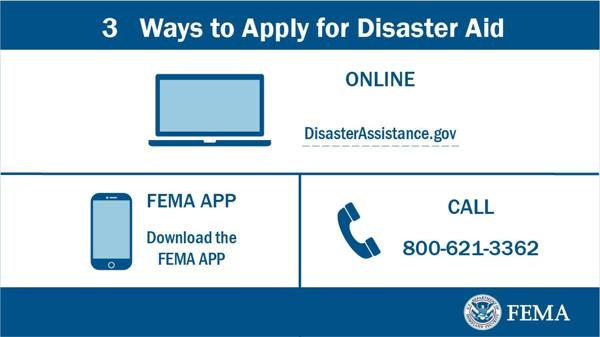
Hurricane Ian was a deadly and destructive Category 4 storm that caused widespread damage across Florida as well as South Carolina and Cuba. It was the second major hurricane of the 2022 Atlantic hurricane season.
The following updates and resources are from FEMA's newsroom and will be revised often so check back often and share with others...
As of Nov 4, more than $1.93 billion in federal grants, disaster loans and flood insurance payments has been provided to the state of Florida and households to help survivors jumpstart their recovery after Hurricane Ian.
FEMA has provided $719 million to households and $322 million to the state for emergency response, while the U.S. Small Business Administration has provided $562 million in disaster loans and the National Flood Insurance Program has paid $332 million in claims.
Safety Considerations for Residents
- Be alert. Be attentive to scam artists and identity thieves who are attempting to take advantage of survivors. Watch for and report any suspicious activity, or anything that just doesn’t seem right to you. All FEMA employees carry an official badge. Federal and local disaster workers do not solicit or accept money. Read more about identifying Scams and Fraud.
- Be careful when cleaning up. Wear protective clothing, including work gloves and sturdy thick-soled shoes. Do not try to remove heavy debris by yourself. Use an appropriate mask if cleaning mold or other debris. People with asthma and other lung conditions and/or immune suppression should not enter buildings with indoor water leaks or mold growth that can be seen or smelled.

Resources to Jumpstart Recovery
- Residents in 26 counties (Brevard, Charlotte, Collier, DeSoto, Flagler, Glades, Hardee, Hendry, Highlands, Hillsborough, Lake, Lee, Manatee, Monroe, Okeechobee, Orange, Osceola, Palm Beach, Pasco, Pinellas, Polk, Putnam, Sarasota, Seminole, St. Johns and Volusia counties) are eligible for individual assistance.
- FEMA is meeting survivors where they are to help jumpstart their recoveries. Disaster Survivor Assistance specialists are going door-to-door in Florida neighborhoods to help individuals register for assistance. These teams have interacted with more than 90,000 survivors in designated counties.
- Survivors can visit one of 23 Disaster Recovery Centers operating in Brevard, Charlotte, Collier, DeSoto, Flagler, Glades, Hardee, Highlands, Hillsborough, Lake, Lee (2 locations), Manatee, Okeechobee, Orange, Osceola, Pasco, Polk, Putnam, Sarasota, Seminole, St. Johns and Volusia counties. More centers are planned to open in the coming days. Interpretation services and translated materials are available at these centers to help survivors communicate in the language with which they feel most comfortable. Disaster Recovery Center locations are chosen for their accessibility, with the goal of reaching as many people as possible. As centers are added, real-time locations will be updated at FloridaDisaster.org.
- FEMA expanded the Transitional Shelter Assistance Program to seven more counties, for a total of 26 counties that are eligible for temporary hotel stays for survivors who cannot remain in their homes because of storm damage. As of today, the program is providing housing for 2,449 households with 6,157 members.
- Hundreds of FEMA inspectors have performed over 191,648 home inspections for survivors who registered for federal disaster assistance.
- FEMA will provide temporary housing to eligible Hurricane Ian survivors in Charlotte, Collier, DeSoto, Hardee, Lee and Sarasota counties. FEMA approved Direct Temporary Housing Assistance to provide options for those whose homes are uninhabitable because of the hurricane. FEMA determined that rental assistance is insufficient to meet the housing need in those counties because of a lack of available housing resources. FEMA will notify applicants who are eligible for direct housing. It will take time to transport, permit, install and inspect these units before they are available. Direct Temporary Housing Assistance may be provided for up to 18 months from Sept. 29, 2022, the date of the federal disaster declaration, to March 28, 2024.
- The U.S. Small Business Administration has approved $562 million in low-interest disaster loans to homeowners, renters and business owners. Business Recovery Centers are located in Collier, DeSoto, Hillsborough, Lee and Seminole counties.
- As of Nov 3, FEMA’s National Flood Insurance Program (NFIP) has received more than 43,000 flood insurance claims and paid more than $332 million to policyholders, including $166 million in advance payments.
- NFIP policyholders may receive up to $1,000 to reimburse the purchase of supplies like sandbags, plastic sheeting and lumber. They may also receive up to $1,000 in storage expenses if they moved insured property. Policyholders should file a claim for flood loss avoidance reimbursement, regardless of if it was successful in preventing flood damage.
- FEMA is conducting local hiring for more than 300 jobs in Brandon, Fort Myers, Kissimmee, Orlando and Sarasota. These positions are full-time, 120-day appointments that may be extended depending on operational needs. Interested candidates are encouraged to apply online through USAJobs.gov. Click here for instructions on how to apply.
- Disaster Unemployment Assistance is available to eligible survivors. Floridians should file a claim for loss of income caused by Hurricane Ian by going to Disaster Unemployment Assistance - FloridaJobs.org and selecting "Apply for Hurricane Ian DUA," visiting a local CareerSource Career Center, or calling 800-385-3920. Customer service representatives are available Monday through Friday from 7:30 a.m. to 6:30 p.m. ET.
- Low-income Florida residents recovering from Hurricane Ian may be eligible for assistance from the Department of Agriculture’s Disaster Supplemental Nutrition Assistance Program (D-SNAP). Survivors can find more information on Florida’s D-SNAP program by visiting the Florida Department of Children and Families’ Hurricane Ian Response & Recovery website.
- As of Nov. 3, Operation Blue Roof has installed 18,569 roofs. This is a free service provided to homeowners and is currently operating in Charlotte, Collier, Desoto, Lee and Sarasota counties. Residents impacted by Hurricane Ian can sign up at BlueRoof.us or call toll-free at 1-888-ROOF-BLU (1-888-766-3258) for more information. The call center will be open from 8 a.m. to 8 p.m. ET.
- National Flood Insurance Program Florida policyholders who had flood damage from the hurricane now have a 90-day window to renew their policies. The extension applies to policies with renewal dates beginning Aug. 25 through Oct. 23. Policyholders whose policy renewal date is in this range should contact their agent or insurance company. FEMA also extended the proof of loss requirement for flood insurance policyholders in Florida who suffered flood damage from Hurricane Ian from 60 to 365 days. For more information on how to file a flood insurance claim, visit How to Start Your Flood Insurance Claim.
- If you or a member of your household uses adaptive or accessibility items that were damaged by Hurricane Ian, you may be eligible for FEMA assistance for those items. For homeowners, items can include an exterior ramp, grab bars and a paved pathway to the home’s entrance from a vehicle. Awards do not count toward your Housing Assistance or Personal Property maximum awards. For more information for homeowners and renters, visit Update to FEMA’s Individual Assistance Program and Policy Guide.
- Small Business Administration disaster loans are available to businesses, homeowners, renters, and nonprofit organizations in some Florida counties. Applicants may apply at disasterloanassistance.sba.gov under declaration #17644. For help, call 800-659-2955 or send an email to DisasterCustomerService@sba.gov.
- Mental health resources are available. Survivors experiencing emotional distress can call or text the Disaster Distress Helpline at 800-985-5990. The national hotline provides free 24/7 crisis counseling for people who are experiencing emotional distress related to any natural or human-caused disaster. Deaf and hard of hearing ASL callers can use a videophone or ASL Now.
- The Internal Revenue Service announced tax relief for individuals and households affected by Hurricane Ian that reside or have a business anywhere in the state of Florida. If you are in one of the counties eligible in Florida, you now have until Feb. 15, 2023 to file various individual and business tax returns and make tax payments.
- When lives are upended by a flood or hurricane, treasured possessions such as family heirlooms, photos and other keepsakes become more cherished. FEMA.gov has multilingual resources to help salvage hurricane and flood-damaged items.
- Floridians who use Veterans Affairs medical centers and clinics and need urgent care services should call 877-741-3400. Find a list of open VA centers at Find VA Locations | Veterans Affairs. Additionally, the Heritage Health Emergency Pharmaceutical Refill Program is activated in Florida, call at 866-265-0124, option 1 with questions. The hotline is open Monday through Friday from 7 a.m. to 11 p.m. ET, and weekends from 9 a.m. to 5:30 p.m. ET. Veterans needing emergency refill locations can visit va.hhspharmacy.com/locations/index.html.
- Visit Hurricane Ian | FEMA.gov for information and resources available for Florida residents affected by the storm. The page will be available in Creole, Simplified Chinese, Portuguese, Spanish and Vietnamese.
How to Help
After a disaster, people come together to help. To make the most of your contributions, it’s important to follow guidelines for donating and volunteering responsibly.
- Please do not self-deploy. If you want to volunteer as part of the Hurricane Ian recovery, visit Florida’s official volunteer portal at VolunteerFlorida.org to find volunteer opportunities.
- Think long term. There will be volunteer opportunities for months, often years, after the disaster. A list of agencies with volunteer opportunities can be found on the National Voluntary Organizations Active in Disaster website at www.nvoad.org.
- Cash is the best donation. After a disaster, people always want to help, but It’s important to donate responsibly. When people support voluntary organizations with financial contributions, it helps ensure a steady flow of important services to the people in need after a disaster find local charities at www.nvoad.org
- See more tips on how to help others when disaster strikes
Find more resources and assistance info for survivors of Hurricane Ian at FEMA.gov
Cover photo: Lee County Sheriff's Office

